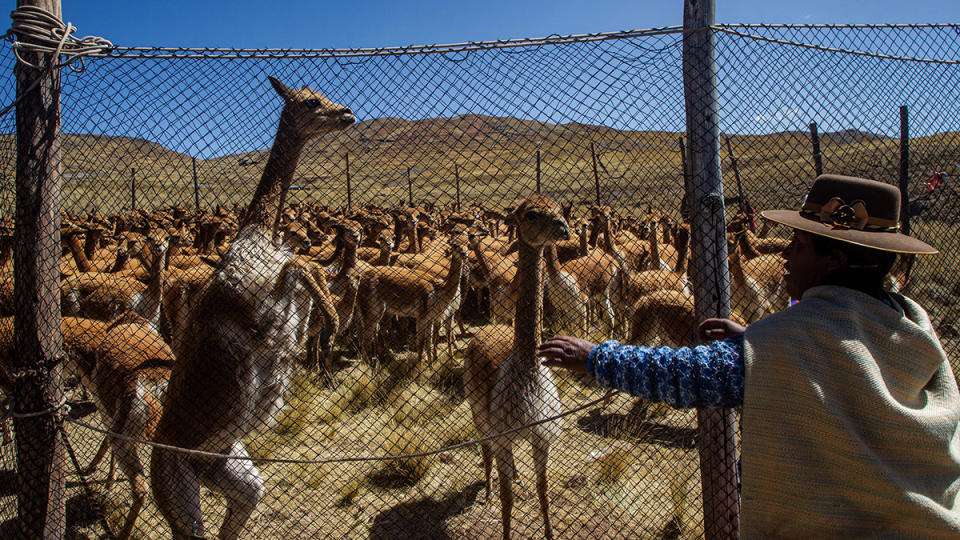A U.S. Lawmaker Is Accusing Loro Piana of Exploiting Peruvian Workers

A U.S. lawmaker is attempting to unravel the impact Loro Piana’s sweater production may have on Peruvians.
The Italian fashion house has been making thousand-dollar garments out of vicuña wool for three decades, but congressman Robert Garcia believes local workers are being exploited in the process.
More from Robb Report
Denim Is the Fashion World's Funnest Flex Right Now. Here's How to Wear the Latest Styles.
Princess Diana's Iconic 'Black Sheep' Sweater Just Sold for a Record $1.1 Million at Auction
Statement Sweaters Are This Fall's Most Important Menswear Flex. Here's How to Style One.
“This seems to me as clearly exploitation and it is a huge multinational corporation that is owned by some of the wealthiest people in the world,” Garcia, a democrat from California, said in an interview with Bloomberg. “Seeing no benefit coming down to the immense labor that is happening here I think is really concerning.”
Vicuña camelids, which freely roam the Andes Mountains, were nearly brought to extinction by over-farming during the colonial era before they were declared endangered in the 1960s. The population has since recovered with the installation of protected habitats and the revival of cruelty-free Incan shearing practices. Loro Piana has been at the forefront of protecting vicuñas, working with the Peruvian government and Andean communities since 1994 to safeguard the animal. In 2008, the LVMH brand purchased nearly 5,000 acres in the Peruvian Andes to create a vicuña reserve, for instance. Today, Loro Piana controls much of the global supply of rare vicuña wool.

A Bloomberg Businessweek report published earlier this month purports that the knitwear trade has failed to improve the livelihoods of some of Peru’s poorest citizens, though. The price paid to Lucanas villagers for raw vicuña yarn has dropped by 36 percent over the last decade, the publication says. Villagers in Lucanas earn just $280 shearing vicuña for Loro Piana, according to the report. (Sweaters made from the super-soft wool can sell for as much as $9,000.)
Garcia, who was born in Peru, sent a letter to Loro Piana president Antoine Arnault and chief executive Damien Bertrand last Friday, demanding that the label provide written answers to Congress by the end of April. (Antoine is the son of billionaire LVMH CEO Bernard Arnault, who currently ranks as the world’s richest person with a reported net worth of $230 billion.)
“Despite the success of Loro Piana, the Indigenous people of this region remain deeply impoverished,” Garcia wrote in the letter. “This is little evidence the benefits of the return of vicuñas population has trickled down to those it should be benefiting most.”
Loro Piana formally refuted the allegations in a statement sent to France’s AFP agency on Thursday, adding that the reality of the situation was not reflected. “With regard to the Lucanas community, the volume of Loro Piana’s purchases from them is equivalent to 4 percent of the total quantity purchased by the label in Peru,” the company said. “Thanks to this harvest, the community receives from Loro Piana up to several hundred thousand dollars, on average, for their work every year.”
The label added that the wool harvest only takes place one day per year and that the price per kilo ranges between $300 and $400, depending on the harvest and market demand. It also said it has paid Peru-based suppliers nearly $20 million over the past decade to buy vicuña yarn.
Loro Piana did acknowledge that the situation “may be challenging for some” and says it will “carry out initiatives” on the ground in Peru to further strengthen its control of the local supply chain to ensure that the sums paid to the organizations in charge of the harvesting are “equitably allocated and redistributed.”
Best of Robb Report
Sign up for Robb Report's Newsletter. For the latest news, follow us on Facebook, Twitter, and Instagram.


